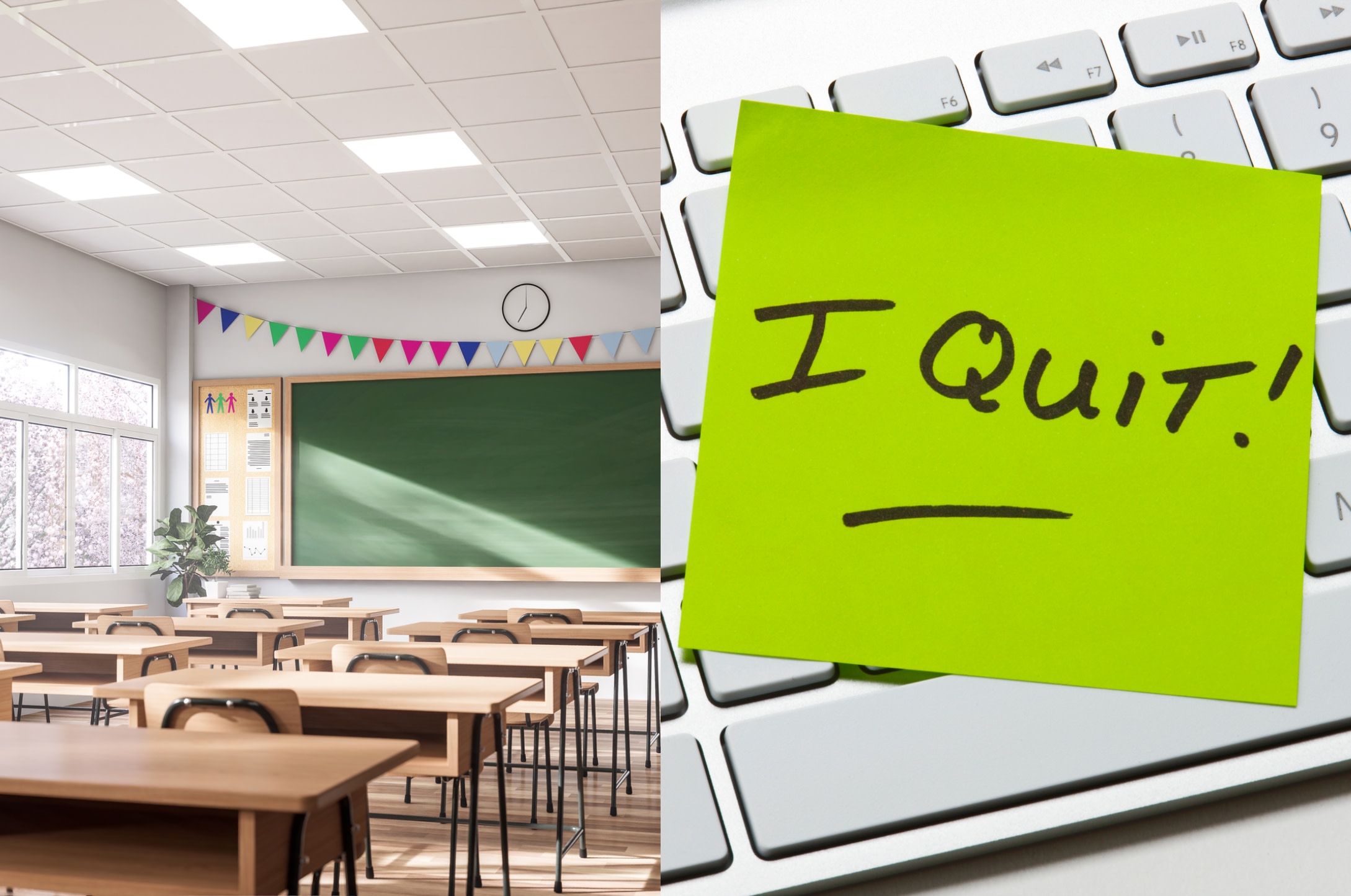
Most of us are well aware that being a teacher is a tough gig. But most of us might not know just what an uphill battle it truly is (especially for teachers in low-income areas). It's for this reason that a South Carolina teacher's resignation letter went viral, thanks to the powerful way it highlights the "hamster wheel" teachers often feel they can't get off, as they work long hours for low pay.
More from CafeMom: 'Gained a Girl, Almost Lost a Boy': Baby Gender Reveal Goes Horribly Wrong
Sariah McCall is a 28-year-old teacher who left her job at Murray-Lasaine Elementary School, citing 'systemic abuse.'
Sound dramatic? Just wait until you hear about her typical workday, which she detailed further to the Washington Post after her resignation letter went viral.
It began at 6:30/6:45 a.m. — an hour at which many adults are still prying their eyelids open. In the brief time before students would arrive at school at 7 a.m., McCall said she would quickly read emails that came in overnight and prep for the day.
Once morning announcements were over, McCall began teaching — all subjects, aside from "specials" (aka music, art, and physical education). That precious time during specials was the only time she got to grade or plan lessons, except that more often than not, they were taken up by preplanned meetings she had to attend.
Lunch was eaten in haste, while doing work; trips to the bathroom were few and far between; and even once the final bell rang at 2:15, she wasn't off the clock just yet — that was when she switched to bus or hall duty for school dismissal, followed by more grading or lesson planning until 5 p.m. Even once she was home, McCall says she often graded papers until 11 p.m. before falling asleep, completely exhausted.
Ask most educators, and they'll say McCall's story sounds pretty familiar. It's just that they wouldn't have had the guts to quit in the way she did.
"I felt like I was running on a hamster wheel going nowhere," McCall recently told Yahoo Lifestyle. "I was just working all the time and there was still more to do. The to-do-list was never-ending. I just couldn't do it anymore."
And so, she decided not to.
McCall wrote a letter to Charleston County School District Superintendent Gerrita Postlewait, explaining why she was leaving.
In it, McCall first explained that her reasons have nothing to do with her students or fellow faculty members, who she says were a "perfect fit." But in the end, she found the unrealistic expectations placed upon her and her fellow teachers to be unsustainable.
"I cannot set myself on fire to keep someone else warm," she explained, before continuing her letter:
"The systemic abuse and neglect of educators and other public service workers in the state of South Carolina should have its citizens so enraged. The unrealistic demands and all-consuming nature of the profession are not sustainable. I am still a human being. There was no time to be a functioning human being and give this job all the attention and love it deserves. This career with its never-ending list of 'extra duties and responsibilities' that we are not given the resources for completing. I cannot let a career dictate and demand all of me for another minute, and I will not be bullied into continuing to do so out of misguided guilt for possibly neglecting the children. It is unrealistic to expect this much from people. We’re teachers, but we’re still people."
Nothing will change, McCall wrote, unless the public begins to demand it. Because 'we need to prioritize education, not just offer it lip-service.'

"Until enough people decide that this is worth making a fuss over, those that are in power have no reason to listen to our hurt, pleas, and fears to make any changes," she continued. "This will keep happening. It will not get better like this."
Teachers need resources, plain and simple. They also deserve not to be worked to the bone during 60+-hour work weeks while collecting pitiful wages.
McCall said her decision ultimately came down to one thing: whether she was willing to put her career before her family and her health.
"The profession existed before me and will continue to exist without me," she continued. "My children had teachers before me and they will have many after me. But my family only has one of me. I only have one chance to live a life that fulfills all of me, not just my career goals. I have to prioritize my values. Words cannot express the guilt, shame, and sadness I feel that my sweet children and lovely school have been or may continue to be negatively impacted by this in any way."
Her words are enough to sock you right in the gut. And yet, they echo so much of what teachers across the nation have been saying — no, shouting — at the top of their lungs for years. It's why so many teacher strikes erupted over the course of 2018 in states such as West Virginia and Oklahoma, and why US teachers are leaving the profession at alarming rates, according to Quartz.
It's also why teachers everywhere are offering virtual high fives to McCall for speaking up about a very real and very pressing issue.

"There’s mass teacher burnout in this state. We’re so overworked," eighth-grade math teacher Sanni Perry told Yahoo! Lifestyle. "We don’t have break to go to the bathroom or eat lunch. When you combine all that together on top of the financial stress, you can only give so much of yourself. I’m putting out all these fires but there’s nothing left for me to give. I cannot maintain a healthy lifestyle and keep my sanity with everything that I’m having to do."
On Facebook, thousands have responded to McCall's letter, which hit home for many.
"I usually don’t respond to posts but Sarah’s letter hit home!" wrote one man on a post by WSB-TV. "My wife just resigned from teaching this year, effective at the end of this school year in May after teaching 20 years. The negative comments people have made here are so so sad. They have no clue what a teacher goes through! … Something needs to drastically change in the public school systems and soon!"
"I know this feeling all too well," wrote another woman. "Seven years in … Definitely can't do 30, hope to make it to 10."
More from CafeMom: Day Care Worker Refuses To Let Parents Drop Off Sleeping Kid
Sadly, the burnout rate isn't just an issue among teachers; it's rapidly spreading across many industries within the US.
According to CNBC, a 2018 Gallup study of nearly 7,500 full-time employees found that 23% reported feeling burned out at work either "very often" or "always." Another 44% reported feeling that way "sometimes."
That's perhaps no surprise, in a country that seems to worship the 24/7 work culture, where job burnout has been linked to $125 billion to $190 billion in health care costs each year. Whereas other countries (especially those in Europe), seem to value ample leisure time, flexible work schedules, and more generous maternity and paternity leaves, the US is lagging behind. And the effects of this, as McCall's letter so beautifully calls out, is that we've produced a culture of adults who feel as if they're chained to their desks, no longer passionate about that they do because it's all they do.
As McCall shares, something has to change. And at the very least, that change starts with our teachers, who are so very needed to educate tomorrow's generation.
McCall also points out the similarities between teaching and being in an abusive relationship.
McCall called out how the expectations that teachers face mirror the signs of abuse that the Domestic Abuse Hotline highlights.
“If you replace ‘he’ with ‘public education,’ it would almost match perfectly with what we are all going through across America,” she wrote. “In the hardest act of selfishness I have ever been faced with, I must put myself over the demands of helping raise other people’s children. I won’t be in an abusive relationship with public education any longer.”




